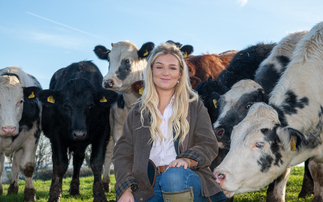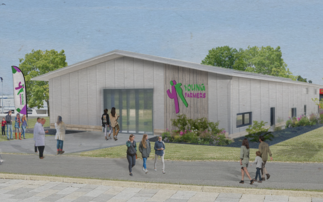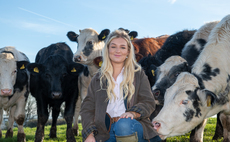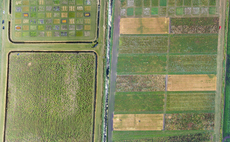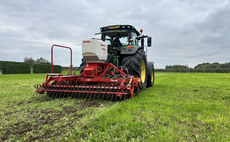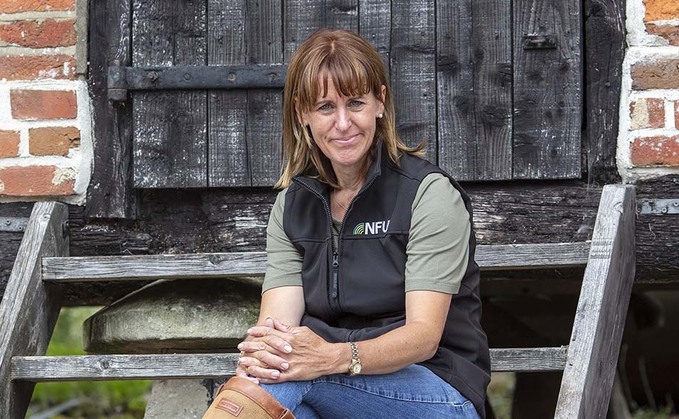
With more people engaging with the countryside than ever before, NFU president Minette Batters believes now is the time for British farmers to showcase what they can deliver for society. She tells Olivia Midgley why she is backing #FarmingCAN.��
Presenting solutions rather than problems has always been a key strategy in NFU president Minette Batters' lobbying efforts and it is something she says is critical as the industry competes for investment in a post-Covid world.
With agriculture's unique ability to address some of society's biggest challenges, she knows the sector has a compelling case and says �������� Guardian's #FarmingCAN campaign will help hammer home the message to policymakers and the public.
"This is a great campaign and it highlights the industry's ability and potential to deliver jobs, green growth and economic prosperity," she said.
"I think #FarmingCAN will help to inspire political and business ambition to invest in the rural economy, of which agriculture underpins every part.
"It will also showcase what the country really loves about this sector, the culture and the heritage, the ‘green gym' and the ambition of the extraordinary network of farming businesses, 50 per cent of which are tenanted. That is a great national attribute."
With surveys consistently highlighting public support for home-grown food production and for farmers as the most trusted actors in the food supply chain, Ms Batters agreed a ‘whole sector approach' was needed to help raise the industry's profile and demonstrate what it can do.
"The opportunities for our sector are enormous and we have never had greater public support," she said.
While the pandemic has brought its challenges and hardship for many, including Ms Batters' own diversification, it has also sparked a reset moment which many businesses are already capitalising on.
"This is a very exciting time where we have huge opportunities on the back of Covid-19 which I think is going to drive the agenda in a more localised way. How we buy our food, the way we can produce fibres to live more sustainably, growing exports and delivering on climate goals," she added.
"Everything is driven by the need for a robust carbon pricing system but the opportunity is there.
"However, it has to be a business approach because that is what every farmer is doing - running a business.
"The better that business is and the more economically viable and profitable it becomes, the more it will be able to do for the environment."
Opportunities
Making sure these messages are carried through the corridors of Westminster is vital and Ms Batters used two recent opportunities to sit down with the Prime Minister to promote agriculture as a key block which will help the Government in its goal to 'build back better' from the economic slump.��
"This Government has committed to being the greenest ever and it is out there setting targets," she added.
"This has got to be about business decisions which must allow the infrastructure of agriculture to grow and certainly not be diminished.
"With 70 per cent of the UK farmed landscape, the future has to be around sustainable development. If we can get the business case right, the rest of it is a natural outcome.
"There are also a lot of exciting job opportunities that will come on the back of carbon neutral food production."
The Wiltshire beef farmer, who unveiled the union's Levelling Up Report for Rural Areas at its conference in February, said she often made the case that a large amount of foreign investment came to the UK because of the country's thriving agricultural sector.
"We are underpinning this huge part of the rural economy," she said.
"Initially I was hearing that the Treasury ‘is not really interested in food grown on our land', but when you make the case for the foreign investment that is here, for example, Arla, Muller, ABP, Dawn Meats, purely because the raw ingredients are here, it is literally a lightbulb moment."
But on the back of one of the biggest recessions in living memory and away from the comfort blanket of the Common Agricultural Policy, she is acutely aware of the funding battle farming faces.
"I have always felt strongly that if you are lobbying you need to go with the solution rather than what is wrong," she said.
"When they [policy-makers] get the problems is when they tend to give everything a wide berth.
"We cannot devolve responsibility and blame Brussels anymore. This is about acting on our own behalf and in the national interest.
Investment
"We have got to make the case for future investment at farm level in a parliamentary cycle on the back of Covid-19 - this has got to be a really collaborative approach where everyone is joined into that vision."
Faced with sweeping reductions in farm support from this year and battling a ‘land sparing' mentality pushed by environmental groups which have the ear of Government, Ms Batters says there are hills to climb and that is why a unified approach across the industry is critical.
"My frustration at the moment is around this idea of land sparing because it has got to be about land sharing," she said.
"And it has got to be delivered through the lens of business because the more we can have economic stability in the countryside the more we can do for the environment and for biodiversity. If you have austerity in the countryside it is a lose-lose for everyone."
She also highlighted the social ramifications of ill-thought-out policies.
"It makes me shudder when I hear people talking about the Committee on Climate Change report and ‘land sparing' - effectively removing people from the land.
"You cannot talk about those living, breathing communities like that," said Ms Batters, adding that while land may be farmed in a different way in the future, it must continue to sustain its communities.
"You have to make it work on a land sharing basis because there is no other way of doing it.
"The fundamental point is that we have a maritime climate, we grow grass and we should be proud to have livestock production and we should be exporting what we are not consuming. The real challenges for climate change are not here in the UK."
Efficiency
A beef suckler producer, Ms Batters has placed a large emphasis on making efficiency savings within her own business and this has helped increase productivity.
"For me it has been about trying to build a business where every single thing pays its way," she said, highlighting her main diversification into weddings.
She also earns extra income providing winter grazing for polo ponies.
But it is the streamlining of the suckler enterprise which has paid dividends, especially in the last 12 months when the wedding and events sector was decimated by Covid-19.
"We calve in spring and autumn averaging 100 per cent live cow/calf ratio, with 100 breeding cows," she said.
"The focus has been on renewing our leys, getting more clover integrated, more ability to lock down nitrogen in a natural way and take out the synthetic fertiliser because it takes out cost. It has been about effectively producing more but reducing costs."
She has also moved from all continentals, to all Simmentals and now to Aberdeen-Angus cross Herefords.
"They cost less money to keep, they are a lighter animal and with the premium on the Angus, that makes up for where we were with the continentals.
"We are continually trying to drive it forwards to keep that level of investment going," she said, adding the focus on health status and genetics had been strategic.
"It made a big difference for us focusing on the growth rates with��estimated breeding values��because we are bringing finishing times forward and it allows the people who buy our stores to get them finished before they are 18 months old.
"I am always focusing on continual improvement of the business.
"Diversification has been part of that but still the core is 100 per cent farming and what the last 12 months have shown me is that the business still stands on its own two feet."
Conveying the message to consumers
A key part of the #FarmingCAN campaign is conveying to the public what farming businesses can deliver and how.
Ms Batters believes public engagement of paramount importance and pointed to last year's NFU petition on food standards which received more than one million signatures, showing a proportion of the public is engaged on the topic.��
She said: "The success of British food has been its greatest challenge. If you look at the journey over the last 20 years, from what was a disastrous situation where food scares ruled the agenda to what we have now which is probably the safest, shortest supply chains in the world, we have probably got the safest food system in the world and the most affordable food in Europe.
"It has been an incredible success story that everybody completely takes for granted, so I think the outer engagement is key."
About #FarmingCAN
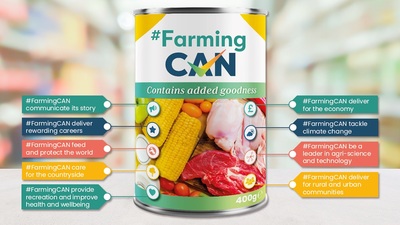
Over the next 12 months, #FarmingCAN will distil real-life farming stories, initiatives, case studies and strategies into relevant, bite-size messages appropriate for the general public.
We will be sharing this information with the public using social media to provide farming facts; answering their questions, dispelling myths and putting the real truth out there to demonstrate how farming is adapting, explain what is being done and bring the public and farmers closer together.
This positive campaign will showcase the people, organisations and efforts of the whole farming industry to the general public through FGInsight.com/FarmingCAN and the dedicated public-facing social media accounts @FarmingCAN onTwitter, Instagram and Facebook.





